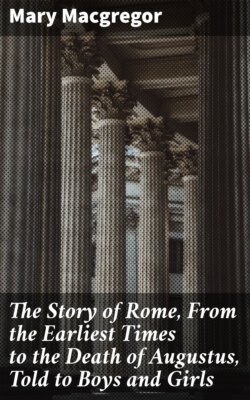Читать книгу The Story of Rome, From the Earliest Times to the Death of Augustus, Told to Boys and Girls - MacGregor Mary Esther Miller - Страница 33
На сайте Литреса книга снята с продажи.
CHAPTER XXXI
THE FRIEND OF THE PEOPLE
ОглавлениеTable of Contents
Ten years after the decemvirs had been banished, there was a severe famine in Rome. The misery was terrible—men, women, and little children were dying in hundreds for lack of bread.
Faint and stricken, those who still managed to exist looked to the Senate for help.
So Minucius was appointed Master of the Markets, and did his utmost to succour the people, buying large supplies of corn from foreign countries and selling it to them for a small sum.
Should a family be found to have in its possession more corn than it needed for a month, Minucius ordered the surplus to be sold to those who were starving. Slaves were put on the smallest possible allowance of food.
But, in spite of the efforts of Minucius, the misery in the city was but little less than before. The poor still suffered the awful pangs of hunger, and many threw themselves into the river Tiber to escape from their desperate plight.
When the famine was at its height, Mælius, a rich plebeian, full of pity for the suffering he saw on every side, sent to Etruria for large quantities of corn and divided it among the ravenous folk.
Sometimes he gave his bounty freely, at other times he took a small sum of money for his goods.
The patricians, who, needless to say, were not starving, were not pleased to hear of the generous gifts of Mælius. Instead of being glad that the poor hungry people were being fed, they murmured that he was doing what Minucius had been appointed to do. The truth was, that the patricians were seized with an ugly passion called jealousy, and the more the people showed their gratitude to their benefactor, the angrier, the more jealous grew the patricians.
It was certain that Mælius was trying to win the favour of the people for his own ends, said his enemies one to the other. What was his ambition, they wondered, and how could they thwart it?
Minucius, who was more suspicious of the good plebeian than any one else, informed the Senate that Mælius held secret meetings in his house, where he had concealed a large number of arms. Moreover, he declared that Mælius had bribed the tribunes, and soon the Republic would be overturned, while the traitor would reign as king.
The Senate, alarmed by such a report, did not stay to find out if it were true or false, but at once determined to elect a Dictator.
Cincinnatus was once again entreated to leave his plough, to come to Rome and save his country.
So, lest his country should be betrayed by the honest plebeian, Cincinnatus hastened to the city, and appointing one named Ahala master of the horse, bade him summon Mælius to the Forum. Here the Dictator awaited the traitor, sitting on his tribunal.
Mælius knew all that had been said against him, and not wishing to be accused of treason, he refused to go with Ahala, and appealed to the people he had helped to support him.
But Ahala, furious that the plebeian dared to ignore his summons, drew a dagger and stabbed Mælius to death.
The people, horrified at the fate of their friend, rushed to the Forum and demanded that the Dictator should punish Ahala.
But this Cincinnatus refused to do, saying that even if Mælius had not been guilty of treason, yet he had deserved death for disobeying the command of the Dictator.
Too weak from want of food to persist that their benefactor should be avenged, the people, so some stories tell, soon grew quiet, for Minucius promised that the corn still stored at the house of Mælius should be sold to them at a low price.
But other stories say that the people refused to be satisfied until they had driven Ahala from the city.
It was in such selfish, wicked ways that the patricians sought to ruin the plebeians when they saw them gaining power and influence in the State.
